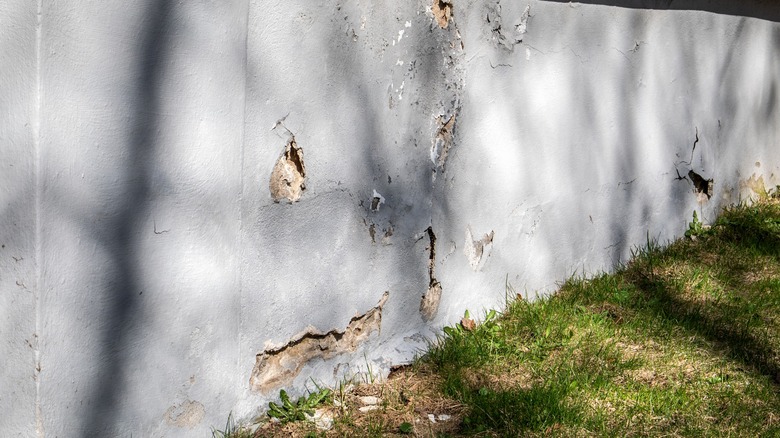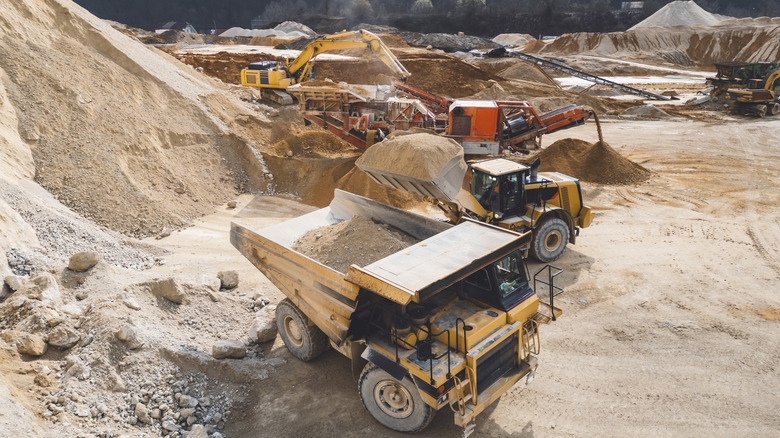Massachusetts Residents Are Stuck With Crumbling Foundations. Here's What's In The Works
"Location, location, location" is a popular refrain when it comes to home buying. Choosing a house in the right spot can turn a smart investment into a brilliant one. But what can you do if unseen and unpredicted forces are literally eating away at the foundation of your investment? Homeowners in parts of Massachusetts are dealing with just that. Inspections are an integral part of the home buying process, but it's hard to catch troubles that lie hidden until emerging much later to everyone's surprise.
Pyrrhotite, an ingredient in concrete foundations used in the state, is causing the concrete to fail, leaving residents with few options for repairs or legal recourse. Insurance companies are refusing to cover the cost of repairs, and few homeowners can shoulder the roughly $200,000 needed to fix the issue. And while in the past, the federal government has helped some of the affected homeowners in neighboring Connecticut, with recent cuts in FEMA support, the state has been wrestling with how to afford support for residents.
There's a glimmer of hope that the state government is coming to the rescue. However, how much of a rescue, and when it could happen, is still uncertain. The combined efforts of lawmakers and the advocacy group Massachusetts Residents Against Crumbling Foundations have been fighting to secure state funding to study the ongoing problem and assist homeowners with the crippling cost of repairs.
Lawmakers recently struck a $61.1 billion budget deal that includes funding to fight the problem. These funds help homeowners make repairs as well as reserving monies to research the phenomenon. But how much of this hefty chunk of change will go toward solving this issue, and when homeowners can hope for the relief this money will provide, remains to be seen.
What's happening to these homes?
Weak foundations wreak havoc on a home's structure, and many Massachusetts residents are discovering this first hand. The foundations of many dwellings in the central and western parts of the state as well as neighboring areas in Connecticut and New Hampshire are made with concrete containing pyrrhotite. This mineral gives concrete a fatal flaw; when pyrrhotite is exposed to air and water, it reacts by expanding, causing the concrete to crack and fail.
As the foundations crumble, the homes become unstable and can eventually become unlivable. Insurance companies aren't stepping up, and banks aren't likely to lend money for repairs when the damage so greatly diminishes a home's value. With no way of selling their damaged homes or footing the bill for brand new foundations, most homeowners were left without hope.
After investigations, quarries in Massachusetts and other nearby states as well as Canada were found to contain pyrrhotite. These quarries supply aggregate for concrete used in building foundations. The state has previously enacted legislation preventing more problematic foundations from being built, but that didn't address the many homes whose owners need help now. The newly-approved budget includes funds for a study group to solve this crisis that's consistently worsened over nearly a decade. The goal is to gain further knowledge about the problem and research feasible means of assisting homeowners.
What can affected homeowners expect?
Although a solution is still months away at best, Massachusetts property owners finally see a glimmering light at the end of the tunnel. After years of attempts to garner state assistance, legislators succeeded in earmarking some of Massachusetts's 2026 budget to put toward the issue. Their plan includes financing a commission dedicated to researching the problem further and suggesting possible remedies. The report on this group's findings is due at the end of March 2026; while this date may feel frustratingly distant, having some sort of problem-solving deadline after years of activism is reassuring to lawmakers and affected citizens.
Connecticut has confronted its own pyrrhotite disaster by adding a monthly surcharge of $1 for homeowner insurance policies. This program generated $55 million that, along with $150 million in state-funded bonds and federal assistance, has gone toward property repairs. Massachusetts Republican state Senator Peter Durant is aiming to implement a similar program in his home state.
If you're a Massachusetts resident and are seeing signs of a problem with your home's foundation, the state government will partly reimburse you for the cost of contractor-led testing. If you suspect that the damage is due to pyrrhotite, you can access resources for partial reimbursement by filling out this application form. For more information on problem sites and general advocacy, contact the Massachusetts Residents Against Crumbling Foundations.


